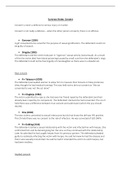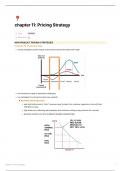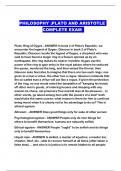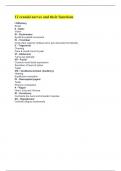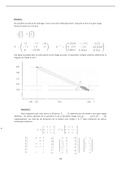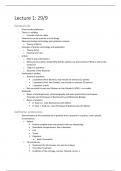Summary Notes: Consent
Consent is never a defence to serious injury or murder.
Consent is not really a defence – when the other person consents, there is no offence.
• Donovan (1934)
A girl consented to be caned for the purpose of sexual gratification. The defendant could not
be guilty of assault.
• Slingsby (1995)
The defendant and the victim took part in “vigorous” sexual activity (consensual). As a result
of this the victim died from blood poisoning (caused by small cuts from the defendant’s ring).
The defendant could not be found guilty of manslaughter as there was no unlawful act.
Real consent
• R v Tabassum (2000)
The defendant persuaded women to allow him to measure their breasts on false pretences
(they thought he had medical training). This was held not to be true consent as “the act
consented to was not the act done”
• R v Olugboja (1982)
The victim submitted to rape as she had seen her friend raped by the defendant (and had
already been raped by his companion). The defendant claimed she had consented. The court
held there was a difference between true consent and submission (which the jury should
decide).
• Dica (2004)
The two victims consented to sexual intercourse but did not know the def was HIV positive.
The CA held there was no consent to the risk of infection. He was convicted of S20 OAPA.
• R v Golding (2014)
The defendant started a sexual relationship with the victim and infected her with herpes. She
confronted him and he denied giving her the virus so they continued with the relationship.
Later he admitted he had caught herpes from his previous partner. The defendant pleaded
guilty to recklessly infecting the victim with herpes. He said he knew he had the disease and
that it was sexually transmitted. He said he hadn’t intended the victim to catch herpes, but
had been reckless.
Implied consent
,In some everyday situations the courts imply consent to minor touchings – otherwise these
would be battery, for example in a crowded shop, at a nightclub, on a tube train.
• Wilson v Pringle (1987)
The court held that the “ordinary jostlings of everyday life were not battery” (i.e. Shaking
hands, patting on back in friendship etc).
A person who takes part in contact sports (i.e. Rugby) is implied to have consented to the
contact, however, this only applies to contact that is within the rules. The breach of the rules
must be serious:
• Barnes (2004)
A serious football injury was not held to be S20 GBH.
Consent to minor injuries
There has been some confusion as to whether consent is a defence to S47 offences (ABH) as
the injuries are not serious. However, in:
• AGs ref (No 6 of 1980) (1981)
2 men agreed to a fight after a quarrel. The CA held that consent cannot be a defence to
fights causing ABH as this would not be in the public interest.
The court went on to list exceptions to this rule:
- properly conducted games/sport
- lawful chastisement
- reasonable surgical interference
- dangerous exhibitions etc. (The etc means more situations can be added if it is in the
public interest)
There is some criticism of the courts decisions in cases where only minor injuries have been
inflicted . However, the decisions have been made for public policy reasons:-
• R v Brown (1993)
A group of consenting adult, male, sado-masochistic, homosexuals were convicted of S47
(ABH) and S20 (Malicious wounding) as the court felt their actions were not in the public
interest and “Society is entitled and bound to protect itself against a cult of violence”
HOWEVER, IN
, • Wilson (1996)
A husband branded his initials on his wife’s buttocks with a hot knife (with her consent). She
needed medical attention. The court in this case held that it was not in the public interest to
criminalise such behaviour (they even likened it to having a tattoo).
THE IMPORTANT DIFFERENCE HERE IS IN WILSON THE ACT WAS COMMITTED WITHIN A
“NORMAL” MARRIAGE.
Mistaken belief in consent
If the defendant genuinely but mistakenly believes the victim is consenting, there is a
defence to assault.
This area of the law is criticised as it is hard to see the general principle that people should
not cause each other harm for no good reason upheld:
• R v Jones (1986)
Two schoolboys were thrown into the air by older youths. 1 suffered a broken arm, the other
a ruptured spleen. The defendant’s claimed the victims had consented to the act. Their
convictions for S20 were quashed as the judge had not allowed the issue of mistaken belief in
consent to go to the jury. The court said that mistaken belief in “rough and undisciplined
horseplay” could be a defence even if the belief was unreasonable.
• R v Aitken (1992)
RAF officers poured white spirit over a colleague who was wearing a fire-resistant flying suit,
but he was asleep and drunk at the time. He suffered 35% burns, the officer’s convictions for
s20 OAPA 1861 were quashed on the basis that consent should have been put to the jury.
The need for a defence of consent
The defence is important in some situations, such as the exceptions stated in AG’s Reference
(1981).
The exceptions listed in this case are based on public policy, such as allowing team games to
be played, reasonable surgical interference.
It must be noted that these games must be played within the rules; a deliberate, malicious
tackle in football which results in injury would be a criminal offence.
In Barnes (2004), the court said that in order to establish whether the conduct was criminal
the following factors should be considered:
• intentional infliction of injury is always considered criminal,
, • if the act was reckless it will depend if it occurred during actual play, if it was done in
temper etc.
• “off-the-ball” injuries are more likely to be criminal,
• if the play is within the rules of the game it is unlikely to be held to be criminal.
It is felt that these rules achieve a good balance – allowing the game to be played but
ensuring they are not abused.
Medical treatment
If the treatment is used to save a patient’s life, or improve their health consent will always be
a defence to assault.
Mentally capable adults must consent to medical treatment, if they refuse and treatment is
carried out, this is a criminal offence, even if it saves their life.
If a patient is unable to give consent (i.e. unconscious) the Dr will try to get consent from a
relative. If this is not available a Dr can perform treatment without the consent, but only in an
emergency.
Consent is never a defence to serious injury or murder.
Consent is not really a defence – when the other person consents, there is no offence.
• Donovan (1934)
A girl consented to be caned for the purpose of sexual gratification. The defendant could not
be guilty of assault.
• Slingsby (1995)
The defendant and the victim took part in “vigorous” sexual activity (consensual). As a result
of this the victim died from blood poisoning (caused by small cuts from the defendant’s ring).
The defendant could not be found guilty of manslaughter as there was no unlawful act.
Real consent
• R v Tabassum (2000)
The defendant persuaded women to allow him to measure their breasts on false pretences
(they thought he had medical training). This was held not to be true consent as “the act
consented to was not the act done”
• R v Olugboja (1982)
The victim submitted to rape as she had seen her friend raped by the defendant (and had
already been raped by his companion). The defendant claimed she had consented. The court
held there was a difference between true consent and submission (which the jury should
decide).
• Dica (2004)
The two victims consented to sexual intercourse but did not know the def was HIV positive.
The CA held there was no consent to the risk of infection. He was convicted of S20 OAPA.
• R v Golding (2014)
The defendant started a sexual relationship with the victim and infected her with herpes. She
confronted him and he denied giving her the virus so they continued with the relationship.
Later he admitted he had caught herpes from his previous partner. The defendant pleaded
guilty to recklessly infecting the victim with herpes. He said he knew he had the disease and
that it was sexually transmitted. He said he hadn’t intended the victim to catch herpes, but
had been reckless.
Implied consent
,In some everyday situations the courts imply consent to minor touchings – otherwise these
would be battery, for example in a crowded shop, at a nightclub, on a tube train.
• Wilson v Pringle (1987)
The court held that the “ordinary jostlings of everyday life were not battery” (i.e. Shaking
hands, patting on back in friendship etc).
A person who takes part in contact sports (i.e. Rugby) is implied to have consented to the
contact, however, this only applies to contact that is within the rules. The breach of the rules
must be serious:
• Barnes (2004)
A serious football injury was not held to be S20 GBH.
Consent to minor injuries
There has been some confusion as to whether consent is a defence to S47 offences (ABH) as
the injuries are not serious. However, in:
• AGs ref (No 6 of 1980) (1981)
2 men agreed to a fight after a quarrel. The CA held that consent cannot be a defence to
fights causing ABH as this would not be in the public interest.
The court went on to list exceptions to this rule:
- properly conducted games/sport
- lawful chastisement
- reasonable surgical interference
- dangerous exhibitions etc. (The etc means more situations can be added if it is in the
public interest)
There is some criticism of the courts decisions in cases where only minor injuries have been
inflicted . However, the decisions have been made for public policy reasons:-
• R v Brown (1993)
A group of consenting adult, male, sado-masochistic, homosexuals were convicted of S47
(ABH) and S20 (Malicious wounding) as the court felt their actions were not in the public
interest and “Society is entitled and bound to protect itself against a cult of violence”
HOWEVER, IN
, • Wilson (1996)
A husband branded his initials on his wife’s buttocks with a hot knife (with her consent). She
needed medical attention. The court in this case held that it was not in the public interest to
criminalise such behaviour (they even likened it to having a tattoo).
THE IMPORTANT DIFFERENCE HERE IS IN WILSON THE ACT WAS COMMITTED WITHIN A
“NORMAL” MARRIAGE.
Mistaken belief in consent
If the defendant genuinely but mistakenly believes the victim is consenting, there is a
defence to assault.
This area of the law is criticised as it is hard to see the general principle that people should
not cause each other harm for no good reason upheld:
• R v Jones (1986)
Two schoolboys were thrown into the air by older youths. 1 suffered a broken arm, the other
a ruptured spleen. The defendant’s claimed the victims had consented to the act. Their
convictions for S20 were quashed as the judge had not allowed the issue of mistaken belief in
consent to go to the jury. The court said that mistaken belief in “rough and undisciplined
horseplay” could be a defence even if the belief was unreasonable.
• R v Aitken (1992)
RAF officers poured white spirit over a colleague who was wearing a fire-resistant flying suit,
but he was asleep and drunk at the time. He suffered 35% burns, the officer’s convictions for
s20 OAPA 1861 were quashed on the basis that consent should have been put to the jury.
The need for a defence of consent
The defence is important in some situations, such as the exceptions stated in AG’s Reference
(1981).
The exceptions listed in this case are based on public policy, such as allowing team games to
be played, reasonable surgical interference.
It must be noted that these games must be played within the rules; a deliberate, malicious
tackle in football which results in injury would be a criminal offence.
In Barnes (2004), the court said that in order to establish whether the conduct was criminal
the following factors should be considered:
• intentional infliction of injury is always considered criminal,
, • if the act was reckless it will depend if it occurred during actual play, if it was done in
temper etc.
• “off-the-ball” injuries are more likely to be criminal,
• if the play is within the rules of the game it is unlikely to be held to be criminal.
It is felt that these rules achieve a good balance – allowing the game to be played but
ensuring they are not abused.
Medical treatment
If the treatment is used to save a patient’s life, or improve their health consent will always be
a defence to assault.
Mentally capable adults must consent to medical treatment, if they refuse and treatment is
carried out, this is a criminal offence, even if it saves their life.
If a patient is unable to give consent (i.e. unconscious) the Dr will try to get consent from a
relative. If this is not available a Dr can perform treatment without the consent, but only in an
emergency.


